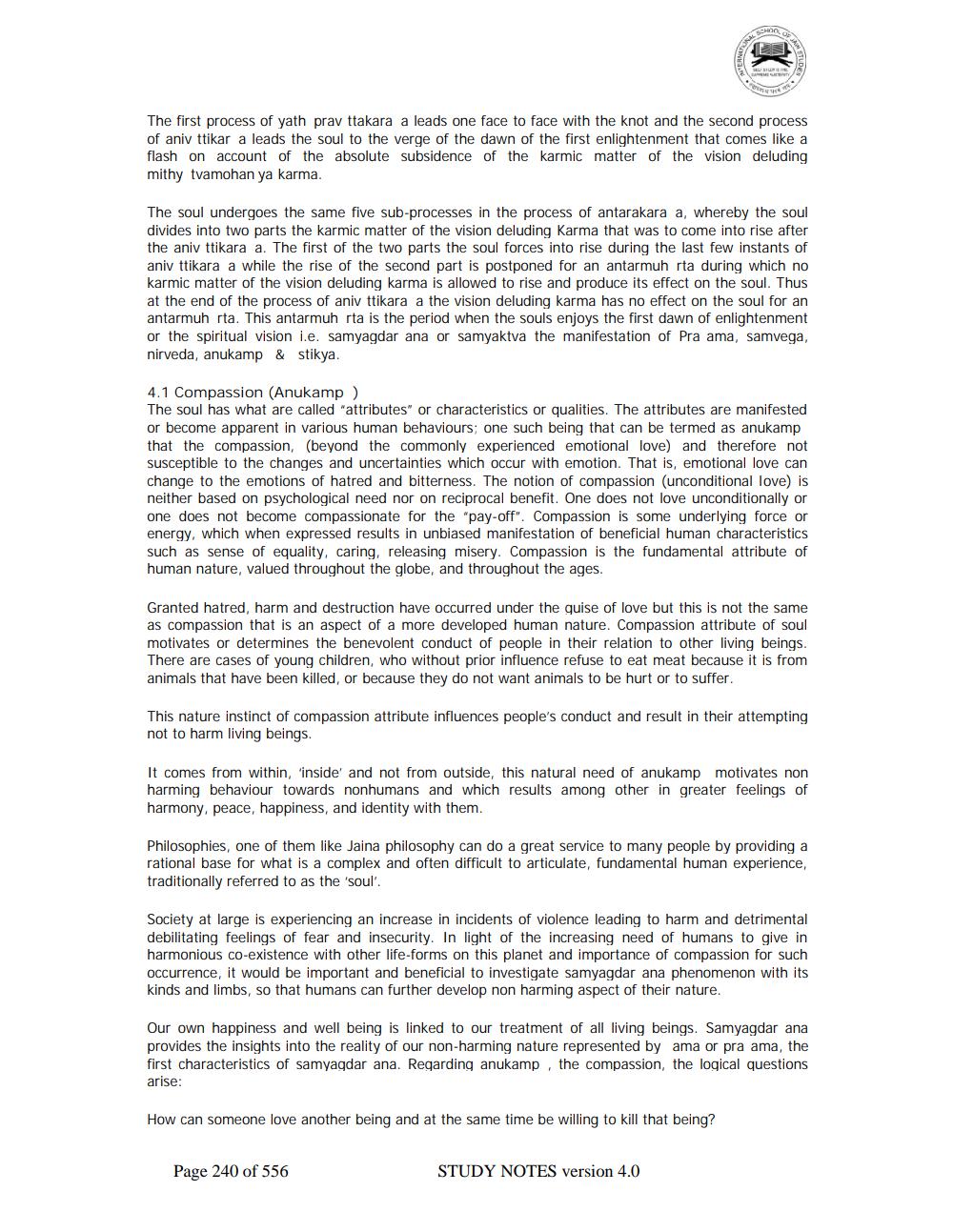________________
The first process of yath prav ttakara a leads one face to face with the knot and the second process of aniv ttikar a leads the soul to the verge of the dawn of the first enlightenment that comes like a flash on account of the absolute subsidence of the karmic matter of the vision deluding mithy tvamohan ya karma.
The soul undergoes the same five sub-processes in the process of antarakara a, whereby the soul divides into two parts the karmic matter of the vision deluding Karma that was to come into rise after the aniv ttikara a. The first of the two parts the soul forces into rise during the last few instants of aniv ttikara a while the rise of the second part is postponed for an antarmuh rta during which no karmic matter of the vision deluding karma is allowed to rise and produce its effect on the soul. Thus at the end of the process of aniv ttikara a the vision deluding karma has no effect on the soul for an antarmuh rta. This antarmuh rta is the period when the souls enjoys the first dawn of enlightenment or the spiritual vision i.e. samyagdar ana or samyaktva the manifestation of Pra ama, samvega, nirveda, anukamp & stikya.
4.1 Compassion (Anukamp)
The soul has what are called "attributes" or characteristics or qualities. The attributes are manifested or become apparent in various human behaviours; one such being that can be termed as anukamp that the compassion, (beyond the commonly experienced emotional love) and therefore not susceptible to the changes and uncertainties which occur with emotion. That is, emotional love can change to the emotions of hatred and bitterness. The notion of compassion (unconditional love) is neither based on psychological need nor on reciprocal benefit. One does not love unconditionally or one does not become compassionate for the "pay-off". Compassion is some underlying force or energy, which when expressed results in unbiased manifestation of beneficial human characteristics such as sense of equality, caring, releasing misery. Compassion is the fundamental attribute of human nature, valued throughout the globe, and throughout the ages.
Granted hatred, harm and destruction have occurred under the guise of love but this is not the same as compassion that is an aspect of a more developed human nature. Compassion attribute of soul motivates or determines the benevolent conduct of people in their relation to other living beings. There are cases of young children, who without prior influence refuse to eat meat because it is from animals that have been killed, or because they do not want animals to be hurt or to suffer.
This nature instinct of compassion attribute influences people's conduct and result in their attempting not to harm living beings.
It comes from within, 'inside' and not from outside, this natural need of anukamp motivates non harming behaviour towards nonhumans and which results among other in greater feelings of harmony, peace, happiness, and identity with them.
Philosophies, one of them like Jaina philosophy can do a great service to many people by providing a rational base for what is a complex and often difficult to articulate, fundamental human experience, traditionally referred to as the 'soul'.
Society at large is experiencing an increase in incidents of violence leading to harm and detrimental debilitating feelings of fear and insecurity. In light of the increasing need of humans to give in harmonious co-existence with other life-forms on this planet and importance of compassion for such occurrence, it would be important and beneficial to investigate samyagdar ana phenomenon with its kinds and limbs, so that humans can further develop non harming aspect of their nature.
Our own happiness and well being is linked to our treatment of all living beings. Samyagdar ana provides the insights into the reality of our non-harming nature represented by ama or pra ama, the first characteristics of samyagdar ana. Regarding anukamp, the compassion, the logical questions arise:
How can someone love another being and at the same time be willing to kill that being?
Page 240 of 556
STUDY NOTES version 4.0




